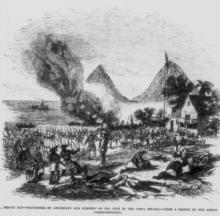- CAC Home
-
About CAC
-
CAC Senior Leaders
Commanding GeneralCombined Arms CenterLTG Milford H. Beagle Jr.Deputy to the
Commanding GeneralCombined Arms CenterMr. Gregg Thompson
Command Sergeant MajorCombined Arms CenterCSM Stephen Helton
Chief of StaffCombined Arms CenterCOL Trent D. UptonCommand Chief Warrant OfficerCombined Arms CenterCW5 Aaron H. Anderson
Deputy
Commanding GeneralCAC ARNGBG Charles MorrisonDeputy
Commanding GeneralCAC USARBG Katherine A. TrombleyDeputy Commanding General - EducationArmy UniversityBG David FoleyDeputy Commanding GeneralCAC - TrainingBG Scott WoodwardDirectorMission Command Center
of ExcellenceCOL Bryan Babich
-
CAC Senior Leaders
-
Organizations
-
CAC HQ
-
CAC Subordinate Organizations
- The Army University (Army U)
- Combined Arms Center - Training (CAC-T)
-
Mission Command Center of Excellence (MCCoE)
- Leadership
- Mission Command Resources
- SharePoint
- Army Joint Support Team (AJST)
- Air Land Sea Space Application Center (ALSSA)
- Combined Arms Doctrine Directorate (CADD)
- Center for Army Leadership (CAL)
- Directorate of Training (DOT)
-
Force Modernization Proponent Center (FMPC)
- Command and Control Integration (C2I)
- Security Force Assistance Proponent (SFAP)
- Contact Us
- Peacekeeping & Stability Operations Institute (PKSOI)
-
Key Partner and Supporting Units
- » Fort Leavenworth Garrison
- » Presidio of Monterey Garrison
- » 902d Military Intelligence Group
- » Munson Army Health Center (MAHC)
- » Joint Center for International Security Force Assistance (JCISFA)
- » U.S. Disciplinary Barracks
- » Community Health Promotion Council (CHPC)
- » Red Team Education
- Contact Us
- Training & Doctrine Command (TRADOC)
- Mission Command Capability Development and Integration Directorate
- 15th MP Brigade
- Centers of Excellence
- Branch Schools
-
Non-Branch Schools
-
Command and General Staff College (CGSC)
- Leaders
- Mission & Vision
- Students
-
Command and General Staff School (CGSS)
- Inbound Class Information
- Department of Distance Education (DDE)
- Department of Command and Leadership (DCL)
- Department of Sustainment and Force Management (DSFM) (Previously DLRO)
- Satellite Campus Program
- Air Force Element (AFELM)
- Navy Element (NAVELM)
- Marine Corps Element (MCELM)
- International Military Student Division (IMSD)
- Contact Us
- School of Advanced Military Studies (SAMS)
- School for Command Preparation (SCP)
- Sergeants Major Academy (SGM-A)
- CGSC Degree Programs
- Registrar
- CGSC News Archive
- Contact CGSC
-
Warrant Officer Career College (WOCC)
- About USAWOCC
- Warrant Officer Program
- Warrant Officer Blackboard Enrollment
- Warrant Officer Courses
- Benefits, Pay, and financial Matters
- Fort Rucker Information
- News/Media
- Retirement/Transition Links
- Warrant Officer Career College Contact Information
- Center for the Army Profession and Leadership (CAPL)
- Western Hemisphere Institute for Security Cooperation (WHINSEC)
- SHARP Academy
- U.S. Army Sergeants Major Academy (USASMA)
- The U.S. Army Inspector General School (TIGS)
-
Command and General Staff College (CGSC)
-
CAC HQ
- References
- Products & Resources
Defeat of the Filibusterer: William Walker and the 2nd Battle of Rivas (1856)
In the decades before the American Civil War, several (mostly southern-born) filibusterers – those who wage illegal, extra-national invasions of other countries – led expeditions to conquer Mexico and several Central American republics. The hope, for some of these filibusterers, was to create new slave states to add to the union. Perhaps the most famous adventurer was William Walker, who led numerous attempts – some temporarily successful – to seize Nicaragua.
Walker gathered an army of a few thousand white southerners who were quite enthusiastic about his cause. They had initial success and Walker had himself “elected” president. Nevertheless, his relatively untrained army was plagued by cholera and mass desertions which thinned his ranks. Fearing that Walker’s army would grow too strong and might spread its area of conquest, Costa Rican President Mora declared war, not on Nicaragua as a whole, but on Walker’s filibusterer usurpers.
Walker wasted no time and immediately invaded Costa Rica itself. In response, the Costa Rican president accompanied the 8,000 man army himself to meet Walker’s invasion, though his brother was in direct military command. On March 20, Mora and 3,000 Costa Ricans attacked and surprised a small force of filibusterers under the inexperienced commander, COL Louis Schlessinger – who had failed to post sentries or conduct reconnaissance. After hearing word of this defeat, Walker led his main army south to recapture the city of Rivas. He’d soon find that the Costa Ricans were ready for him.
In brutal street-to-street fighting, Walker’s men gained small successes and an initial stalemate, but they were ultimately outnumbered and overwhelmed. With many filibusterers now gathered in a key building – El Meson de Guerra – a Costa Rican drummer boy volunteered to torch the thatched roof of the building. This dislodged the filibusterers, although the boy was killed in the process. That night, Walker’s outmatched force slipped out of town and retreated north. Some Costa Rican commanders wanted to pursue, but President Mora paused to bury the dead and deal with a cholera outbreak in camp.
At the cost of 170 casualties (including 130 dead) in his small army, Walker had inflicted only 60 casualties on the Costa Rican force. Walker would continue to fight coalitions of Central American states for three more years until he was finally captured, and executed, by a Honduran force.


